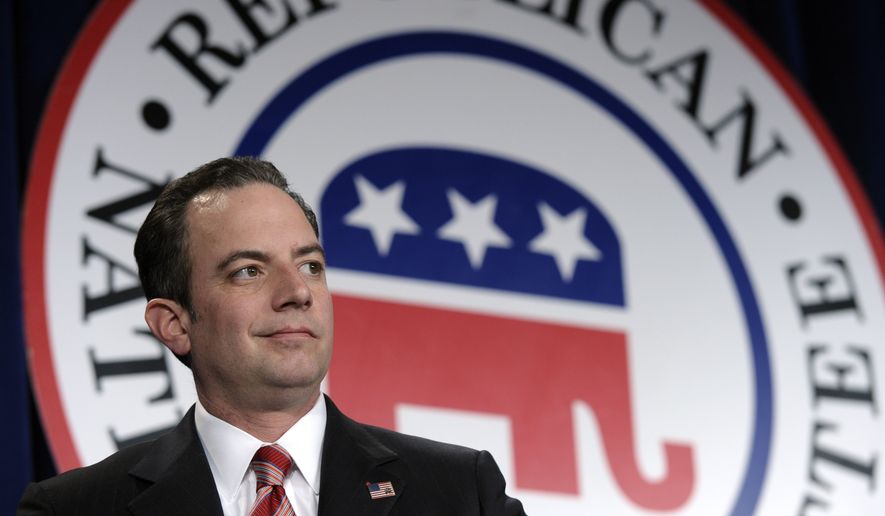HOLLYWOOD, Fla. — A Republican National Convention panel shot down an effort Thursday to simplify the rules for the presidential nomination, but anti-establishment forces claimed victory after the party’s top attorney said existing rules make it difficult to substitute candidates.
General counsel John Ryder told the Republican National Committee’s 56-member panel that changing the rules at the Cleveland convention in July would require a two-thirds vote by the delegates who attend.
Given that front-runner Donald Trump and Ted Cruz are likely to have substantial blocks of loyal delegates, they should be able to stymie any changes on the convention floor intended to try to supplant them as the party’s choices — the fear that prompted the proposed rules change.
The proposal, defeated on an overwhelming voice vote of the Standing Committee on Rules, would have changed the procedures from an arcane 1,500-page rule book based on the U.S. House of Representatives rules. Instead, the party would have used the simpler Robert’s Rules of Order.
Oregon RNC member Solomon Yue proposed the change in the parliamentary rules in the name of transparency.
He wanted to make it harder for the convention chairman to reopen voting to give the nomination to Ohio Gov. John Kasich or some other establishment-favored “white knight” in the event that four or five ballots failed to give Mr. Trump or Mr. Cruz the required 1,237-delegate majority.
But after the defeat of the Yue proposal, a smiling Michael DeSombre, worldwide president of Republicans Overseas, argued that Mr. Ryder’s speech achieved its “very purpose.”
Mr. Ryder argued that there was no basis for Mr. Yue’s “white knight” fears because the presidential nomination process already requires a two-thirds majority vote of the several thousand delegates to change the rules of a convention already underway.
With at least two-thirds of the delegates likely to have pledged their support to either Mr. Trump or Mr. Cruz, a rules change to cheat both would be unlikely.
That represents the transparency Mr. Yue and his supporters, as well as the leadership team led by Chairman Reince Priebus, said they wanted.
“Ironically, if Robert’s Rules of Order had been passed, the nominations could have been reopened by a mere majority to allow Kasich to be nominated after the balloting had begun,” said James Bopp Jr., RNC Rules Committee special counsel. “Now, it will take a two-thirds vote to reopen nominations as a result of Ryder’s official interpretation of the RNC Rules.”
“This apparently closes the door on any chance that Kasich ever had to be nominated at the convention,” Mr. Bopp said.
The Trump and Cruz campaigns and their supporters have hinted at rebellion if party leaders work behind the scenes to make sure neither man gets the nomination.
Both camps imagine the appearance of a “white knight” acceptable to the moderates who control the party apparatus and power centers. They fear Mr. Kasich or even House Speaker Paul D. Ryan will be welcomed into the convention after several ballots in which no one receives a majority.
Mr. Priebus fed that fear when he said only one of the three remaining candidates should emerge as the nominee.
But even to have one’s name put in nomination, under rules passed in 2012, a candidate must have won a majority of the delegates from eight states. Mr. Trump and Mr. Cruz have met that requirement, but Mr. Kasich has won only Ohio and is not leading the polls in any upcoming primary.
When Mr. Priebus said Mr. Kasich could be the nominee, that implied to some that Mr. Priebus must have seen a way to interpret the rules to let him or someone else add Mr. Kasich to the ballot. And then, why not someone else again, Cruz and Trump supporters reasoned.
That sort of “hijacking” of the nomination by someone who won few or no delegates would create chaos at the convention and cause irreparable harm to the party, Mr. Yue and others feared.
A distaste for Mr. Trump led many in the Republican establishment, including 2012 presidential nominee Mitt Romney, Senate Majority Leader Mitch McConnell and Sen. Lindsey Graham of South Carolina, to do what used to be unthinkable: condemn a potential nominee by name as unacceptable and unsupportable.
Meanwhile, influential party figures in and out of office have said Mr. Cruz is the most disliked Republican in the Senate. They say he would likely lose the White House in November and might cost the party control of the Senate and maybe even the House.
• Ralph Z. Hallow can be reached at rhallow@gmail.com.




Please read our comment policy before commenting.